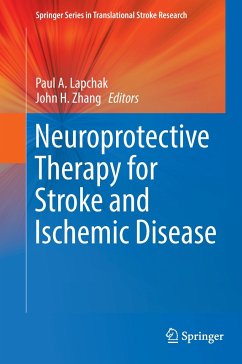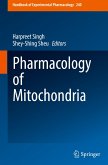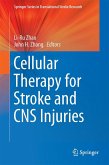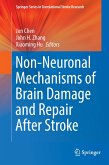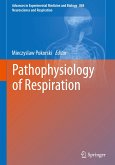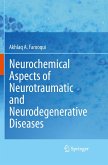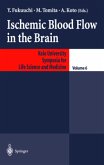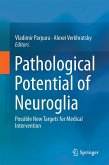Neuroprotective Therapy for Stroke and Ischemic Disease
Herausgegeben:Lapchak, Paul A.; Zhang, John H
Neuroprotective Therapy for Stroke and Ischemic Disease
Herausgegeben:Lapchak, Paul A.; Zhang, John H
- Gebundenes Buch
- Merkliste
- Auf die Merkliste
- Bewerten Bewerten
- Teilen
- Produkt teilen
- Produkterinnerung
- Produkterinnerung
A critical and comprehensive look at current state-of-the-art scientific and translational research being conducted internationally, in academia and industry, to address new ways to provide effective treatment to victims of ischemic and hemorrhagic stroke and other ischemic diseases. Currently stroke can be successfully treated through the administration of a thrombolytic, but the therapeutic window is short and many patients are not able to receive treatment. Only about 30% of patients are "cured" by available treatments. In 5 sections, the proposed volume will explore historical and novel…mehr
Andere Kunden interessierten sich auch für
![Pharmacology of Mitochondria Pharmacology of Mitochondria]() Pharmacology of Mitochondria208,99 €
Pharmacology of Mitochondria208,99 €![Cellular Therapy for Stroke and CNS Injuries Cellular Therapy for Stroke and CNS Injuries]() Cellular Therapy for Stroke and CNS Injuries112,99 €
Cellular Therapy for Stroke and CNS Injuries112,99 €![Non-Neuronal Mechanisms of Brain Damage and Repair After Stroke Non-Neuronal Mechanisms of Brain Damage and Repair After Stroke]() Non-Neuronal Mechanisms of Brain Damage and Repair After Stroke112,99 €
Non-Neuronal Mechanisms of Brain Damage and Repair After Stroke112,99 €![Pathophysiology of Respiration Pathophysiology of Respiration]() Pathophysiology of Respiration75,99 €
Pathophysiology of Respiration75,99 €![Neurochemical Aspects of Neurotraumatic and Neurodegenerative Diseases Neurochemical Aspects of Neurotraumatic and Neurodegenerative Diseases]() Akhlaq A FarooquiNeurochemical Aspects of Neurotraumatic and Neurodegenerative Diseases149,99 €
Akhlaq A FarooquiNeurochemical Aspects of Neurotraumatic and Neurodegenerative Diseases149,99 €![Ischemic Blood Flow in the Brain Ischemic Blood Flow in the Brain]() Ischemic Blood Flow in the Brain161,99 €
Ischemic Blood Flow in the Brain161,99 €![Pathological Potential of Neuroglia Pathological Potential of Neuroglia]() Pathological Potential of Neuroglia75,99 €
Pathological Potential of Neuroglia75,99 €-
-
-
A critical and comprehensive look at current state-of-the-art scientific and translational research being conducted internationally, in academia and industry, to address new ways to provide effective treatment to victims of ischemic and hemorrhagic stroke and other ischemic diseases. Currently stroke can be successfully treated through the administration of a thrombolytic, but the therapeutic window is short and many patients are not able to receive treatment. Only about 30% of patients are "cured" by available treatments. In 5 sections, the proposed volume will explore historical and novel neuroprotection mechanisms and targets, new and combination therapies, as well as clinical trial design for some of the recent bench-side research.
Produktdetails
- Produktdetails
- Springer Series in Translational Stroke Research
- Verlag: Springer / Springer International Publishing / Springer, Berlin
- Artikelnr. des Verlages: 978-3-319-45344-6
- 1st ed. 2017
- Seitenzahl: 816
- Erscheinungstermin: 19. Januar 2017
- Englisch
- Abmessung: 241mm x 160mm x 49mm
- Gewicht: 1311g
- ISBN-13: 9783319453446
- ISBN-10: 3319453440
- Artikelnr.: 45459077
- Herstellerkennzeichnung Die Herstellerinformationen sind derzeit nicht verfügbar.
- Springer Series in Translational Stroke Research
- Verlag: Springer / Springer International Publishing / Springer, Berlin
- Artikelnr. des Verlages: 978-3-319-45344-6
- 1st ed. 2017
- Seitenzahl: 816
- Erscheinungstermin: 19. Januar 2017
- Englisch
- Abmessung: 241mm x 160mm x 49mm
- Gewicht: 1311g
- ISBN-13: 9783319453446
- ISBN-10: 3319453440
- Artikelnr.: 45459077
- Herstellerkennzeichnung Die Herstellerinformationen sind derzeit nicht verfügbar.
Paul Lapchak is the director of translational neurodegenerative disease research at Cedars-Sinai Medical Center in California. Dr. Lapchak obtained his Ph.D. at McGill University and University of Southern California. His lab focuses on developing new therapeutic approaches to treat different types of stroke as well as experimenting with neuroprotective agents. In addition, his research extends to drug development using the rabbit embolic stroke model and multiple assay methods. Dr. Lapchak is editor-in-chief of the Journal of Neurology & Neurophysiology and associate editor of the journal Translational Stroke Research. With over twenty years of experience and numerous publications, Dr. Lapchak is a leading expert in his field of translational stroke research. John Zhang is doctor and professor in the departments of Anesthesiology, Neurosurgery, Neurology, and Physiology at the Loma Linda University School of Medicine in California. He obtained his Ph.D. at the University of Alberta, Canada and his MD at Chongqing University of Medical Sciences, China. His lab focuses on hemorrhagic and ischemic stroke, specifically on cerebral vascular biology, neuroprotection, gene therapy, signaling pathways, and apoptosis. Dr. Zhang is on the editorial boards of the journals Surgical Neurology and Neurological Research. Coauthor of countless publications, Dr. Zhang is also a member of several professional societies and participates in current discussions of stroke disease research and neuroprotection.
Reflections on Neuroprotection Research and the Path Toward Clinical Success.- Systematic review & meta-analysis: important tools in understanding.- Neuroprotection is Technology, not Science.- History of Experimental Stroke Research.- History of Neuroprotection: Trials and Tribulations.- Targeting PSD-95 As a Novel Approach in the Treatment of Stroke.- ATP Sensitive Potassium Channels (KATP) Play a Role in Hypoxic Preconditioning against Neonatal Hypoxic-Ischemic Brain Injury.- Targeting Oxidative Stress in Stroke.- Nitrones, Old Fellows for New Therapies in Ischemic Stroke.- Neuroprotective strategies via modulation of innate immune receptors.- Harnessing the power of the human immune system via multi-omic immune profiling in stroke treatment and recovery.- Polarization of microglia/macrophages in brain ischemia: relevance for stroke therapy.- Endoplasmic Reticulum Stress: An Opportunity for Neuroprotective Strategies after Stroke.- Effects of Neuroprotectants before and after stroke: Statins and Anti-Hypertensives.- Toward Effective Combination Therapy and Pleiotropic Drugs.- TRPM7 Channels as Potential Therapeutic Targets for Stroke Cholinergic Protection in Ischemic Brain Injury.- Remote Ischemic Conditioning: A Highly Translatable Therapy for Acute Stroke.- Hypothermia for Acute Ischemic Stroke.- Modern endovascular treatment of ischemic disease.- Cerebral Microbleeds and Thrombolysis for Acute Ischemic Stroke.- Targeting pericytes and the microcirculation for ischemic stroke therapy.- Thrombolytic and Endovascular Therapies for Acute Ischemic Stroke.- Sonothrombolysis for acute ischemic stroke: a critical appraisal.- Combination Therapy with Thrombolysis.- Oxygen Carriers: Are they enough for cellular support?.- A new paradigm in protecting ischemic brain: preserving the neurovascular unit before reperfusion.- The right rodent for the job: infarct variability between strains and its impact on logistics of experimental animalstudies.- Rabbit Spinal Cord Ischemia Model for the Development of Neuroprotective Treatments.- Stroke Sex Differences: from basic research to clinical trials.- Unpuzzling the co-morbid type 2 diabetes and hypertension-related cognitive dysfunction and stroke.- Sex Specific Factors in Stroke.- Current Imaging Strategies for Patient Selection in Acute Ischemic Stroke Trials
Reflections on Neuroprotection Research and the Path Toward Clinical Success.- Systematic review & meta-analysis: important tools in understanding.- Neuroprotection is Technology, not Science.- History of Experimental Stroke Research.- History of Neuroprotection: Trials and Tribulations.- Targeting PSD-95 As a Novel Approach in the Treatment of Stroke.- ATP Sensitive Potassium Channels (KATP) Play a Role in Hypoxic Preconditioning against Neonatal Hypoxic-Ischemic Brain Injury.- Targeting Oxidative Stress in Stroke.- Nitrones, Old Fellows for New Therapies in Ischemic Stroke.- Neuroprotective strategies via modulation of innate immune receptors.- Harnessing the power of the human immune system via multi-omic immune profiling in stroke treatment and recovery.- Polarization of microglia/macrophages in brain ischemia: relevance for stroke therapy.- Endoplasmic Reticulum Stress: An Opportunity for Neuroprotective Strategies after Stroke.- Effects of Neuroprotectants before and after stroke: Statins and Anti-Hypertensives.- Toward Effective Combination Therapy and Pleiotropic Drugs.- TRPM7 Channels as Potential Therapeutic Targets for Stroke Cholinergic Protection in Ischemic Brain Injury.- Remote Ischemic Conditioning: A Highly Translatable Therapy for Acute Stroke.- Hypothermia for Acute Ischemic Stroke.- Modern endovascular treatment of ischemic disease.- Cerebral Microbleeds and Thrombolysis for Acute Ischemic Stroke.- Targeting pericytes and the microcirculation for ischemic stroke therapy.- Thrombolytic and Endovascular Therapies for Acute Ischemic Stroke.- Sonothrombolysis for acute ischemic stroke: a critical appraisal.- Combination Therapy with Thrombolysis.- Oxygen Carriers: Are they enough for cellular support?.- A new paradigm in protecting ischemic brain: preserving the neurovascular unit before reperfusion.- The right rodent for the job: infarct variability between strains and its impact on logistics of experimental animalstudies.- Rabbit Spinal Cord Ischemia Model for the Development of Neuroprotective Treatments.- Stroke Sex Differences: from basic research to clinical trials.- Unpuzzling the co-morbid type 2 diabetes and hypertension-related cognitive dysfunction and stroke.- Sex Specific Factors in Stroke.- Current Imaging Strategies for Patient Selection in Acute Ischemic Stroke Trials

